Are antibody tests the key to returning to normal?
Dr. Vincent De Gennaro explains how antibody tests work and if they are the key to getting America back to work
Get all the latest news on coronavirus and more delivered daily to your inbox. Sign up here.
Maryland Gov. Larry Hogan is allowing barbershops and hair salons to reopen by appointment only to serve some essential workers – like military personnel and first responders – amid the coronavirus crisis.
The Office of Legal Counsel released new interpretive guidance on Monday recommending that the businesses could resume limited operations if they follow a strict set of guidelines aimed at reducing the spread of COVID-19.
They may serve only one customer at a time, so long as that customer made an appointment and works in an essential job that requires specific grooming standards “or where ungroomed hair could pose a safety risk.” The customer will have to provide written documentation about the requirements or standards from their employer, and the barbershop or salon must keep a copy.
CLICK HERE FOR FULL CORONAVIRUS COVERAGE
Both the customer and the haircutter must wear a face covering, “except to the extent that a face covering on the customer would make it impossible for services to be performed.”
After each customer, the barbershop or salon must clean and disinfect the area in accordance with guidelines from the Centers for Disease Control and Prevention as well as the state’s Department of Health.
The businesses are required to take the customers’ telephone number. If any staff member at the barbershop or salon test positive for COVID-19, the business must notify all customers who came in within 14 days of the test results.
CLICK HERE FOR THE FOX NEWS APP
Barbershops and hair salons have been among the nonessential businesses suffering under widespread economic shutdowns aimed at slowing the spread of the virus. Maryland closed its nonessential businesses on March 30.
There were more than 780,000 confirmed cases of the coronavirus in the U.S. as of Tuesday morning – and over 42,000 deaths, according to Johns Hopkins University. Maryland had more than 13,000 cases and 582 deaths.
Last week, Hogan said the state would begin reopening the economy after expanding its coronavirus testing capacity, increasing its stockpiles of personal protection equipment (PPE), improving hospitals’ ability to deal with surges and implementing a “robust contact tracing operation.”
Since then, the governor’s office said it acquired 500,000 COVID-19 test kits from a South Korean laboratory to help meet those goals.


